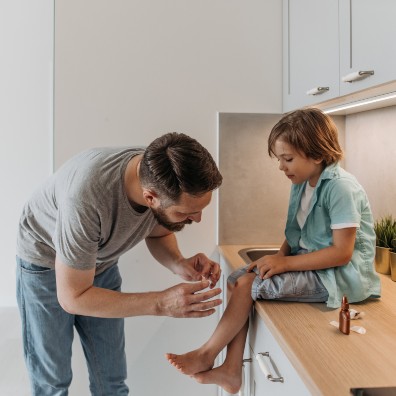By Registered Health Visitor – Julia Headland

When discussing wounds in children, we talk often about scrapes and cuts but really anything that breaks the skin is described as a wound so this can be from an insect bite to a wound from a surgical procedure. Skin is the largest organ in the body and as it has lots of germs on its surface including bacteria, fungi and viruses, any break in the skin carries a risk of germs getting into the body and potentially causing an infection.
How to clean and dress a cut or graze:
Wash your hands thoroughly and dry them.
Put on disposable gloves if you have them.
Clean the wound by rinsing it with bottled or tap water or by using sterile wipes.
Clean the skin around the wound using soap and water or antiseptic but try not to get the antiseptic into the wound.
Pat the area dry using a gauze swab or a clean tea towel.
Put on a sterile dressing or plaster.
(NHS 2023)
Keep the dressing clean by changing it as often as you need; you can take it off in a few days once the wound has closed.
Signs that you will need to see a doctor for a wound:
A wound that has soil, pus or bodily fluids in it or it remains dirty even after it is cleaned.
Your child was bitten by a person or a wild or stray animal.
A cut is swollen, red and getting more painful or pus coming out of it.
A cut is larger than around 5cm (2 inches).
Your child has a fever and/or swollen glands.
Your child’s wound is very painful even with painkillers.
The wound is getting swollen.
There is an expanding area of redness around the wound or red streaks on the skin around the wound.
Your child has signs of dehydration such as weeing less, dark urine, dry mouth, sunken eyes.
Role of Nutrition in Wound Healing
Good nutrition is an essential component of the healing process. Good nutrition involves getting enough calories, proteins, and fluids to facilitate healing but also making sure that your diet consists of a wide variety of vitamins and minerals to ensure healing.
Protein
Protein is by far one of the most important components of wound healing as it helps repair the damaged tissue and lessens the likelihood of infection. The reason for this is that Protein makes up the critical cell structure in muscles, organs, red blood cells and connective tissue. Proteins also contain antibodies and enzymes that maintain immune function.
Micronutrients
Micronutrients are vitamins and minerals that contribute to wound healing and skin health in general. Some of the key micronutrients are:

Vitamin C – we are used to seeing this important vitamin included in skincare but ingested, it has even greater power. Vitamin C is an important antioxidant, it increases the strength of the wound as it heals and helps with the creation of
collagen in the skin. It also helps with the creation of new blood vessels and helps with the absorption of iron. Vitamin C also helps with your child’s immunity.
Vitamin A – A crucial vitamin for immunity, it helps ward off infection and can control the overall inflammatory response.
Vitamin B Complex – These vitamins are helpful for increasing infection resistance and strengthening host
immunity.
Zinc – Helps the body synthesise protein and increase collagen in the skin.
Magnesium, copper, and iron are also helpful for wound healing.
Tetanus
Tetanus is a serious infection that can occur if soil or manure containing bacteria gets into a wound such as a bite, burn or scratch (NHS 2023).
Please make sure your child is fully vaccinated against tetanus. The current vaccination schedule is:
8,12 and 16 weeks as part of the 6-in-1 vaccine.
3 years and 4 months as part of the 4-in-1 pre-school booster.
14 years as part of the 3-in-1 teenage booster.
———End———
For those people I have not yet met, my name is Julia Headland and I am a registered health visitor and registered general nurse with a degree in public health and over 20 years of experience. I am very pleased to work alongside the Norfolk House Nursery team.
You can arrange to meet me for confidential advice or guidance about your child’s health or development; during the pandemic these consultations are being conducted by Zoom or telephone.
My consultations are free of charge and they are confidential.
You can book an appointment with me via the Norfolk House Nursery staff.
You can also follow me on social media:
Facebook: @JuliaHeadlandPrivateHealthVisitor
Instagram: jh_privatehealthvisitor
